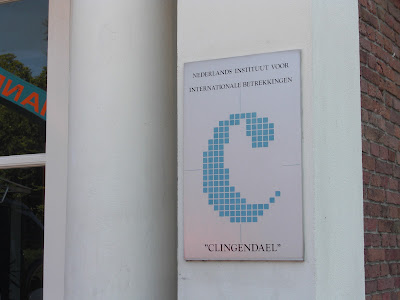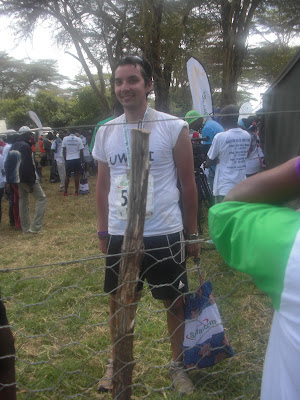Week 4: the penultimate week of the Hague Symposium.
Not ones to let us languish in the wonderful weather, cafes, and ambience in the Netherlands, the IPSI staff had prepared a comprehensive 'Transition Simulation' for all the students to participate in. By comprehensive, I mean three days of immersive role-playing. It was live-action role playing at its finest. Unfortunately, it was based on reality - instead of dressing up as knights, wizards, or elves, we were Presidents, Rebel Leaders, Military Commanders, and NGOs. Before you start fantasizing about a group of characters dressed up like characters from Star Wars, the simulation, while fictional, was based on the situation in Afghanistan.
First, on Monday, we were given a nice lecture on Negotiation strategies, tactics, and theory by Dr. Perlot from the Clingendael Institute. Vastly overconfident, I found out that I have the 'People' negotiation style, which tends towards interpersonal relationships - I am the type that tries to be empathetic, and tries to put the needs of people first. Very sweet. How would that play out in the Transition Simulation?
Before discussing the simulation itself, let's set the stage. Kanrayistan (the fictional Afghanistan) had various domestic and international players in the field. For example, there was the USA, Coalition forces, India, Pakistan, Iran, Chinese business interests, and the UN as international players. More domestically, there was the President, Warlords, the Taliban, The National Army, Oxfam, Pakistani intelligence, the ICC, and Dutch and Australian commanders of the coalition forces. Each one of those positions had player roles, as well as a few other roles (the Media).
I got the role of US Ambassador.
I hope you can imagine the impact of getting that news - I'm a pacifist, anti-imperialist, and a 'people' person. I was now in charge of implementing the ideologies and policies of the most powerful nation on Earth. Ideologies and policies that I don't particularly agree with. That's putting it mildly, but 'hate' is only a word I'll use about things I understand better.
So, now, I'm in a position, with 60 friends, where everyone is now viewing me as a huge bully, as being slightly morally corrupt, and looking to get 'special deals', in order to further the transition of US troops out of the country. A very difficult position to be in, after 3 weeks of getting to know, respect, and become good friends with everyone.
So, now, we have 3 days (which represents about 18 months) to 'transition' Kanrayistan. Here's the recap:
Day 1: We are all friendly, and are working (somewhat slowly) towards trying to find some 'transitional solutions' for the US to pull out its troops while maintaining peace, security, and some form of democracy in the area. First major challenge - despite the fact that the US refuses to 'negotiate' with terrorists, the Taliban really deserve a place at the negotiation table. Putting them there leads to massive unrest, and many different people threaten to leave the negotiation table. When we finally get that sorted, we get a press release saying that the Dutch have left the country, effective immediately, after public pressure back home, and because of a recent suicide bomb attack. That pretty much scuttles all the plans that we had made up until that point.
All in the meantime, everyone is taking time to have side-meetings and caucuses - plotting and scheming - and me and my team are forced to mediate small disputes, while at the same time try and come up with broad strategies for peaceful transition. More soldiers die in suicide attacks.
We continue to work, after dinner. I'm given a note at 2 am about the non-cooperation of the Taliban. I'm also told to prepare for a press briefing, which occurs at 4am. I'm still wearing the same suit, and struggle through the press briefing. But it goes well. (I think?).
Day 2: After an hour of sleep, we move into the next day. Sleep-deprived and feeling overwhelmed, the day passes in a blur. More side-dealings, more major news releases that threaten to overturn everything. There is a decision to exclude the Pakistani secret services from the negotiation table. It passes - the characters playing the Pakistani ISI storm our strategy meeting, I get (softly) assaulted, and the pakistani ambassador leaves in tears. We're all functioning on empty tanks by this point. With an hour left in the day, I take stock of what we've accomplished. Virtually nothing - everything has been about fighting fires and dealing with controversy. The negotiation day ends, and one person, out of character, apologizes if she's been rude. Being the suave character I am, I jokingly say 'yes, you are SO rude'. Tears flow, and I learn a good life lesson - I'm not funny on 1 hour of sleep. At the end of the day, the 'warlords' come in, offer us some M&Ms, and just want to chat. The thought of chocolate made me feel sick, so I left...just as someone snapped a picture.
Final Day: The 'Simulation Control' team made sure to shut things down early, so I managed to get a full 8 hours of sleep. I feel more tired than ever, though. Especially when one of the first things I have to deal with is a 'newspaper article' entitled - "US Ambassador at secret Warlord party with narcotics". Tensions are high, cohesion within my team is crumbling, and my grip on reality is starting to crack a little bit. More 'reports' of people killed in suicide bombings. More communications about side-dealings and double-crossing that undermines everything that we're trying to accomplish. I'm unsure if people are acting in character, or if they are no longer my friends. I'm exhausted.
I give my final press briefing at 12:30. Everyone is there. I am to highlight the 'gains made' in the transitional process. I say a bunch of words, but feel like the whole thing was a total failure. The organizers say "and that brings the simulation to a close!" Everyone applauds. I am a bit in disbelief. After debriefing, the truth comes out - this simulation, this game, was never supposed to be successful. In fact, any time things progressed well, specific measures were taken by the organizers to undermine the progress. It's an interesting thing to think about - I conscientiously strived to create a stable peaceful society, in a mythical nation, in an illusory situation, that was never going to possibly work.
There is a deep, philosophical life lesson there. I'm not sure I've figured it out yet.
On a brighter note - we all hugged and made up afterwards. The next day, we graduated, and it sunk in that this was the ending part of the month-long training.
 |
The IPSI group, freshly graduated
(Courtesy of Khaled) |
It is incredible how in a four-week span, a group of 60 people can change from a group of utter strangers to very close friends. Over and above all the things I learned at the conference, it's always a great feeling to connect with a great group of individuals from all over the world.
Afterwards, I spent the weekend in Amsterdam with some of my old friends. They took me on a boat ride in the canal, a bike ride of the streets, visited relatives, we lounged in the sun at their garden cottage, and took their kids for a swim at the pool. After such an intense month, it was just the sort of pleasant, mundane, and utterly relaxing visit I need.
Emily and I met this Dutch couple 5 years ago, in a random island on a lake in Uganda. You meet some of the most wonderful people in the most random places. It's a good reminder that doing awesome things generally increases your chances of meeting awesome people.
 |
| A Pleasant bike ride through Amsterdam |



















